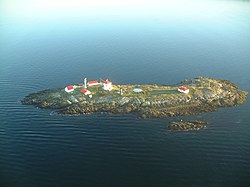Entrance Island (British Columbia)

Entrance Island is a small rocky island in the Strait of Georgia, 841 metres (2,759 ft) due north of Gabriola Island. Marine mammals such as harbour seals and Steller's sea lions use it as a haul-out.
Entrance Island Lighthouse
[edit] Entrance Island Light off Gabriola Island, Georgia Strait, British Columbia | |
 | |
| Location | Gabriola Island Strait of Georgia British Columbia Canada |
|---|---|
| Coordinates | 49°12′33″N 123°48′29″W / 49.209214°N 123.808105°W |
| Tower | |
| Constructed | 1986 (first) |
| Construction | concrete tower (current) wooden tower (first) |
| Height | 14 metres (46 ft) |
| Shape | cylindrical tower with balcony and lantern (current) square tower |
| Markings | white tower, red balcony and lantern |
| Power source | solar power |
| Operator | Canadian Coast Guard [1] |
| Heritage | heritage lighthouse |
| Light | |
| First lit | 1970 (current) |
| Focal height | 19 metres (62 ft) |
| Range | 15 nmi (28 km; 17 mi) |
| Characteristic | Fl W 5s. |
The Entrance Island Lighthouse is a manned light station. It was built in 1875 to guide ships into Nanaimo harbour from the Strait of Georgia, and is easily seen from the Horseshoe Bay to Departure Bay ferry. The Tsawwassen to Duke Point ferry passes right by it.[2]
Oceanographic research
[edit]The Entrance Island Lighthouse is one of 12 lighthouses part of the British Columbia Shore Station Oceanographic Program, collecting coastal water temperature and salinity measurements everyday since 1936.[3] Their data show an increase in coastal water temperatures of 0.15 °C per decade. This trend is believed to be a result of anthropogenic climate change.[4]
See also
[edit]References
[edit]- ^ Rowlett, Russ. "Lighthouses of Canada: Southern British Columbia". The Lighthouse Directory. University of North Carolina at Chapel Hill. Retrieved December 27, 2015.
- ^ Rowlett, Russ. "Lighthouses of Canada: Southern British Columbia". The Lighthouse Directory. University of North Carolina at Chapel Hill. Retrieved 22 January 2012.
- ^ Fisheries and Oceans Canada (2019-03-21). "Data from BC lightstations". www.dfo-mpo.gc.ca. Fisheries and Oceans Canada. Retrieved 2021-02-11.
- ^ "Canada's Changing Climate Report (CCCR)". 2019. p. 358. Retrieved 2021-02-10.
There is only a 1% possibility that the trend is due to chance
- The Entrance Island Lighthouse The Gabriola Historical & Museum Society. Retrieved 22 January 2012.
External links
[edit]- Aids to Navigation Canadian Coast Guard
 Media related to Entrance Island at Wikimedia Commons
Media related to Entrance Island at Wikimedia Commons
